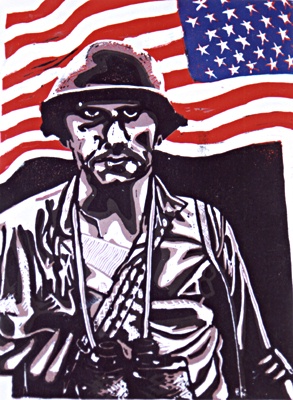All Nonfiction
- Bullying
- Books
- Academic
- Author Interviews
- Celebrity interviews
- College Articles
- College Essays
- Educator of the Year
- Heroes
- Interviews
- Memoir
- Personal Experience
- Sports
- Travel & Culture
All Opinions
- Bullying
- Current Events / Politics
- Discrimination
- Drugs / Alcohol / Smoking
- Entertainment / Celebrities
- Environment
- Love / Relationships
- Movies / Music / TV
- Pop Culture / Trends
- School / College
- Social Issues / Civics
- Spirituality / Religion
- Sports / Hobbies
All Hot Topics
- Bullying
- Community Service
- Environment
- Health
- Letters to the Editor
- Pride & Prejudice
- What Matters
- Back
Summer Guide
- Program Links
- Program Reviews
- Back
College Guide
- College Links
- College Reviews
- College Essays
- College Articles
- Back
Soldiers and PTSD
Soldiers, men and women who go and fight for our country and our home. They leave, they go, they fight and they don’t always get to come home but when they do they aren’t the same anymore. Battles, wars, firefights they change people make them different, turn them into someone they aren’t, this all happens because of PTSD (post traumatic stress disorder). PTSD is the main soldiers that come home come back different because they lost their brothers in arms men and women they were fighting with. Every day about 20 soldiers take their life because of PTSD related problems. I think that the men and women that come home and should be helped, offer a place to live, mental health services, and to be treated like they are people not machines, not murders, and especially not a hostile force.
The Vietnam war, we all know what it is and what happened but what we never pay attention to is what the soldiers were treated like when they came back. They were called baby killers, they were treated like terrorists in their own home and that isn’t right, why would they be treated like they were the enemies when the real enemies were the North Vietnamese (Vietcongs). The PTSD from the soldiers was a lot worse than that, my grandpa is a vietnam veteran and because of the helicopters and everything else he saw and did he can’t do heights he can’t ever sleep that long. How can we help these veterans and how can we make them feel like they matter in life and show that they are important people to us all.
PTSD screwed up a national guard’s mind so much that he got his 9mm and emptied the clip into his family and himself. "None of us believed that anyone could ever suffer from PTSD bad enough to shoot your own 1-year-old baby," says Shawn Ole, PTSD can be a scary thing and it truly is something that you should care about. “A growing literature indicates that family members of deployed military personnel experience more mental health problems and less family cohesion than families of non-deployed service members and veterans.” Jennifer J. Vasterling, these men and women are wanting help they just don’t want to say that they need it, they don’t want to make themselves seem weak or unworthy of fighting for what they believe in. Just have a little empathy for a few minutes and think about what it would be like to have PTSD, think about everything that might happen and think would you want to be helped no matter what.
Now the opponent may claim that PTSD is not a real thing. Yes it could be something that isn’t real but when soldiers are emptying their guns into the people they care about, I’m pretty sure it’s real. These men and women aren’t the monsters they are made out to be, they have just been through alot and have lost their brother/sister in arms. Think about this for a minute if you lost someone like that wouldn’t you be the same way. I believe that everyone deserves a chance to be considered human and not a monster.
In conclusion, people with PTSD aren’t monsters, they are people that have lost a lot and they feel like they don’t matter anymore. Vietnam is a great example of what happens when soldiers are out in the field. These people shouldn’t be cast out from society instead they should be welcomed home. If you were to go out and serve then you would want to be treated like a hero right, not just another man or woman that went and followed orders. I would like to thank you for reading this paper and please if you know a soldier don’t make them feel like an outcast in their country welcome the men and women who protect and serve.
Works cited
Thompson, Mark. "A Soldier's Tragedy." Time 177.9 (2011): 46. MAS Ultra - School Edition. Web. 3 Oct. 2016.
Vasterling, Jennifer J., et al. "Establishing A Methodology To Examine The Effects Of War-Zone PTSD On The Family: The Family Foundations Study." International Journal Of Methods In Psychiatric Research 24.2 (2015): 143-155. Academic Search Elite. Web. 4 Oct. 2016.

Similar Articles
JOIN THE DISCUSSION
This article has 0 comments.
